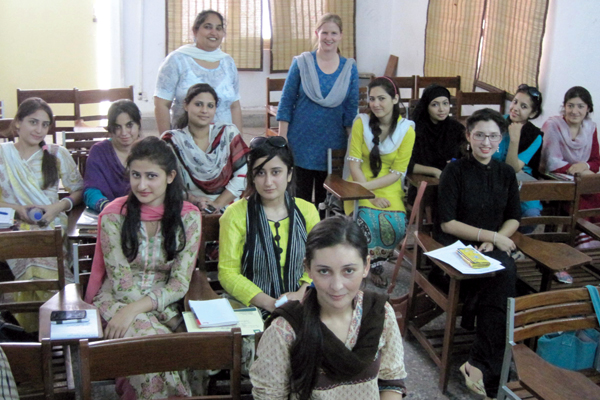With our knowledge of Pakistani society at the South Asia Institute (SAI) we understand that Pakistan faces vital social needs in education, health, rural and urban infrastructure and job creation. We are also acutely aware of the internal conflicts within Pakistani society based on ethnic, religious, gender-based and sectarian tensions. Yet we perceive such moments in a nation’s history as opportunities to rethink a range of options for the future.
One solution to the social problems faced by Pakistan would be the deepening of democratic values that emphasize tolerance and co-existence, coupled with the expansion of educational opportunities that promote these values. Hence we have created opportunities to work with our Pakistani counterparts to chart out a progressive post-secondary educational structure that focuses on the social sciences and humanities. In order to attain this goal SAI was awarded a major three-year grant by the U.S. Department of State that has enabled us to develop an exchange program with the Fatima Jinnah Women’s University (FJWU) in Rawalpindi, Pakistan.
FJWU is a pioneer in women’s post-secondary education in Pakistan. The majority of its students come from the Islamabad-Rawalpindi twin city area. The institution, as a microcosm, embodies the diversity of Pakistan’s social and cultural life, representing as it does the nation’s various ethnicities, religious backgrounds and sectarian groups. In our partnership with FJWU we explore how future graduates from Pakistani universities can acquire the necessary skills to promote respect for cultural difference, economic justice and civic liberties.
During the last two years SAI has hosted 16 scholars from FJWU for semester-long stays, and eight UT faculty and one independent evaluator have travelled to FJWU. One of the goals of this partnership has been to develop new teaching methodologies, curricula and educational materials at FJWU.
It appears we are making strong progress toward that goal, as many of the Pakistani scholars are developing pedagogical skills that are benefitting students at FJWU. One scholar is assigning journal articles to her students and also inspiring other scholars to do the same. The scholars are also learning new assessment strategies, and they are moving away from formal lectures and adopting a freer, more participatory approach to classroom teaching. Several report that they have already taught or plan to teach new courses based on what they have learned at UT Austin.
As the exchange program approaches its end in 2015, we endeavor to create a sustainable collaborative initiative so we can continue to develop and introduce new teaching methodologies at FJWU. Toward this end, SAI is collaborating with UT Global Initiative for Education and Leadership to develop a teacher-training program. We intend to train FJWU faculty on our campus in the coming months and also anticipate sending professional UT Austin trainers to FJWU to conduct teacher- training workshops.
The long term goal of SAI would be to assist FJWU in establishing a Center for Teaching Excellence in Pakistan that could benefit university teachers from the region in imparting advanced teacher training courses. In this process we understand that such undertakings must be embedded in the curricular practices of universities within the United States and South Asia. In our collaboration with FJWU, we ultimately seek to foster and instill an ideal we embrace at UT Austin: to respect difference, be it ethnic, gender or religious in nature.
Kamran Asdar Ali is an associate professor of anthropology and the director of the South Asia Institute at The University of Texas at Austin.
